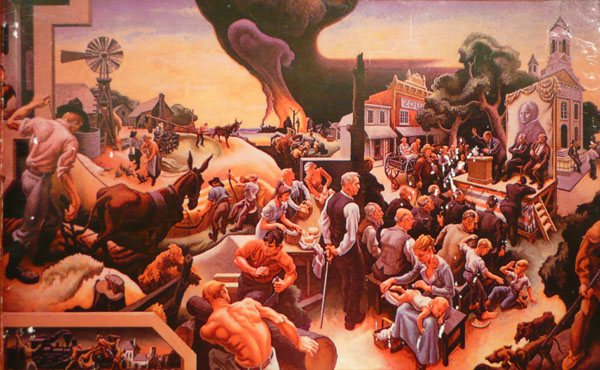WHAT ARE People FOR?

[ What Are People For? cover illustration: Politics, Law, and Farming in Missouri by Thomas Hart Benson ]
This collection of essays by Wendell Berry has the best book title ever. One of the essays is called “Why I Am Not Going to Buy a Computer.” But then, how does he blog?
On April 28 the Seattle City Council passed the Local Food Action Initiative. Nineteen years ago Berry wrote an essay called “The Pleasures of Eating,” in which he lists seven things urbanites can do to help mitigate the decline of farming and rural life in the U.S. Well Wendell, I guess we’re finally catching up with you. And so sorry that Michael Pollen is getting so much credit for ideas you (and others) wrote about decades ago. Alas, we Americans have a hard time paying attention to anyone who doesn’t have the intellectual stamp of approval of the New York Times.
- Participate in food production to the extent that you can. If you have a yard or even just a porch box or a pot in a sunny window, grow something to eat in it. Make a little compost of your kitchen scraps and use it for fertilizer. Only by growing some food for yourself can you become acquainted with the beautiful energy cycle that revolves from soil to seed to flower to fruit to food to offal to decay, and around again. You will he fully responsible for any food that you grow for yourself, and you will know all about it. You will appreciate it fully, having known it all its life.
- Prepare your own food. This means reviving in your own mind and life the arts of kitchen and household. This should enable you to eat more cheaply, and it will give you a measure of “quality control”: you will have some reliable knowledge of what has been added to the food you eat.
- Learn the origins of the food you buy, and buy the food that is produced closest to your home. The idea that every locality should be, as much as possible, the source of its own food makes several kinds of sense. The locally produced food supply is the most secure, the freshest, and the easiest for local consumers to know about and to influence.
- Whenever possible, deal directly with a local farmer, gardener, or orchardist. All the reasons listed for the previous suggestion apply here. In addition, by such dealing you eliminate the whole pack of merchants, transporters, processors, packagers. and advertisers who thrive at the expense of both producers and consumers.
- Learn, in self-defense, as much as you can of the economy and technology of industrial food production. What is added to food that is not food, and what do you pay for these additions?
- Learn what is involved in the best farming and gardening.
- Learn as much as you can, by direct observation and experience if possible, of the life histories of the food species.
— Wendell Berry, 1989
